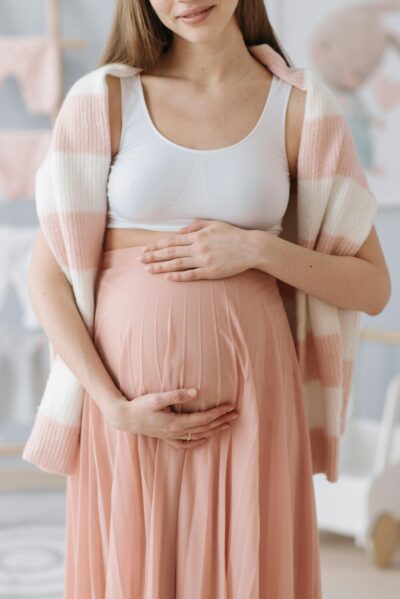
By Ariel Kallenbach, L.Ac., Dipl. MAcCHM
Pregnancy and childbirth are extraordinary journeys, and as you approach the final stages, acupuncture can play a powerful role in supporting your body and mind. Incorporating acupuncture during the third trimester can help prepare your body for labor by promoting cervical ripening, optimizing fetal positioning, improving blood flow, and easing pain and anxiety – all which contribute to a smoother, more empowered birthing experience.
Whether your goal is to minimize medical interventions or approach induction with confidence, acupuncture offers support tailored to your unique birth plan. Research has shown that the rates of medical labor induction have increased significantly over the past few decades. While induction can be a necessary and valuable tool for many mothers, it is often reported to be more uncomfortable and is associated with higher risks of maternal and fetal complications. By encouraging your body to go into labor naturally or improving outcomes when medical induction is needed or wanted, acupuncture can help you achieve a positive and fulfilling birth experience.
In this article, we will explore how acupuncture encourages birth and its research-proven benefits.
Research-Backed Benefits of Acupuncture for Labor Preparation
Research shows that acupuncture can:
- Create optimal conditions for turning a breech baby
- Ease labor pain intensity
- Shorten active labor duration
- Support cervical ripening
- Lower the need for medical induction, epidurals and cesarean section
- Decrease the time between due date and delivery
- Increase rates of spontaneous labor and vaginal delivery
- Minimize the need for post-date induction
- Improve mothers’ satisfaction with their birth experience
Beyond its local effects on the uterine and cervical environment, acupuncture also works on a deeper level by influencing the brain to promote labor. Research has shown that acupuncture stimulates the release of beta-endorphins and adrenocorticotropic hormone (ACTH) from the hypothalamus. The release of these substances may enhance uterine contractility and cervical dilation by increasing oxytocin and prostaglandin release.
From a Chinese medical perspective, the goal of birth encouragement acupuncture is to create balance and harmony in the body, which can help labor progress more smoothly. In this context, acupuncture works to tonify yin, move qi and blood, relax the sinews, and calm the spirit. Acupuncture for labor preparation combines traditional Chinese medicine (TCM) and modern medical insights to optimize conditions for labor.

During labor-preparation sessions, acupuncturists focus on specific acupuncture points that support cervical ripening, help calm the nervous system, improve fetal positioning, and increase blood flow to the uterus and pelvis, which can help make contractions more effective and efficient. Acupuncture can even help create optimal conditions for turning a breech baby when needed.
By combining TCM’s holistic approach with modern medical understanding, acupuncture offers a comprehensive support system to optimize conditions for labor and childbirth.
Reducing Pain and Anxiety for an Empowered Labor
Pain and anxiety are common concerns for expectant mothers. Acupuncture addresses both, helping you feel more confident and calm as you approach delivery.
Acupuncture triggers the body’s natural pain-relieving mechanisms, stimulating endorphin release. The “Gate Control Theory” suggests that acupuncture can block pain signals from reaching the brain, making labor pain more manageable and helping mothers stay focused and calm during contractions. At the Acupuncture Clinic of Boulder, we can support you during your hospital birth or send you home with methods to encourage labor and reduce pain yourself using acupressure.
Acupuncture has long been used to calm the mind and relieve anxiety, supporting a more relaxed labor experience. Reducing anxiety helps break the fear-tension-pain cycle, which may lead to a prolonged or more difficult labor.
The Importance of Cervical Ripening
Cervical ripening—the softening, thinning, and stretching of the cervix—is a crucial factor in labor initiation and progression. It sets the stage for dilation and triggers the release of key hormones such as cortisol, prostaglandins, and oxytocin, which drive contractions and labor progression in response to cervical stretching.
Cervical readiness is one of the most significant factors in labor success. Adequate cervical ripening can help reduce the likelihood of requiring a cesarean delivery or medical induction by promoting spontaneous labor. For patients planning a medical induction, acupuncture can support cervical ripening through similar mechanisms, improving overall outcomes. Individuals with a less favorable cervix (a Bishop score of 6 or below) may face a higher risk of cesarean delivery if induced, but targeted interventions can help optimize the process.
Postpartum Benefits of Acupuncture
Acupuncture doesn’t stop being helpful after delivery—it can play an important role in postpartum recovery. Some key areas where it may assist include:
- Recovery and Healing: Post-birth acupuncture can help regulate bleeding, restore energy, and balance hormone levels. It can also be used in the hospital to reduce post delivery vaginal soreness, physical aches and pains, and hemerrhoids.
- Lactation Support: Certain acupuncture points are known to support milk production, which can be helpful for mothers facing breastfeeding challenges including reducing mastitis.
- Postpartum Mood Support: Acupuncture has been shown to improve symptoms of postpartum depression and anxiety by balancing the body’s energy and promoting relaxation.

What to Expect During Treatment
During your appointment, your practitioner will place thin needles at acupuncture points to prepare your body for labor. Birth encouragement is most often done with electro-acupuncture, which involves sending a gentle current to the points to enhance the treatment’s effects. The sensation is light and comfortable, often described as a buzzing or tapping.
Acupuncture is a safe, low-risk therapy that complements traditional medical care and other forms of birth support. Whether you’re exploring holistic options or seeking a way to enhance your existing birth plan, acupuncture can help. Typically, sessions for birth preparation begin around 36 to 37 weeks and continue until delivery. In a study through the University of Nebraska Medical Center, outcomes in participants enrolled [in acupuncture treatments] at 36 weeks of gestation [versus patients receiving only] conventional care, the … acupuncture group demonstrated reduced labor duration, increased Bishop scores, and improved funneling. Acupuncture to encourage labor is only done when the mother is full-term, to ensure both baby and body are ready. While acupuncture is used throughout pregnancy to support baby and mother, with “birth encouragement” treatments we work in conjunction with your medical provider and make sure they are in agreement with your treatment. If you’re reading this at article at 40 weeks of pregnancy, don’t panic, acupuncture can still be helpful both at the clinic and in the hospital.
The Acupuncture Clinic of Boulder has hospital privileges at Boulder Community Health. In hospital acupuncture can be arranged through your doctor or midwife. If you are birthing somewhere else, please inquire with them to see if acupuncture is an option.
If you’d like to learn how acupuncture can support your labor and delivery, contact the Acupuncture Clinic of Boulder. We would be honored to support you during this transformative time.
About Ariel:

Ariel is a licensed acupuncturist in Colorado and is board-certified through the National Certification Commission for Acupuncture and Oriental Medicine (NCCAOM). She holds a Diplomate in Acupuncture. After completing over 3,000 hours of clinical and academic training at Southwest Acupuncture College in Boulder, Colorado, she earned her Master of Acupuncture, and has a specialty in Chinese Herbal Medicine. She also holds a Bachelor of Arts in Communication from the University of Massachusetts at Amherst.
Ariel has done specialized coursework and had advanced mentorship in OB/GYN and reproductive health. She offers comprehensive care for women through every stage of life, from menstrual health and fertility to menopause. She combines targeted acupuncture and custom herbal treatments to address conditions such as infertility, PMS, PCOS, and more, always staying updated with the latest research for optimized outcomes.
Ariel’s expertise shines across a wide range of health concerns, from chronic pain to enhanced sleep and stress management. She views her role as both a practitioner, and a caring guide, to help you feel seen and empowered in your wellness journey.
Inspired by her own transformative experience with Chinese medicine, Ariel understands the profound relief it can bring. It helped Ariel recover from chronic fatigue and hormonal imbalance. Because Chinese medicine focuses on wellness rather than illness, she found it bridged the gap. There were times when diagnostic tests did not show concrete findings, but she knew she didn’t feel well and wanted to feel better. She is thrilled to share the life-changing benefits of acupuncture with you.
She is originally from New Jersey. Ariel was drawn by the mountains, and in 2019, moved to Colorado. Outside the clinic, she enjoys rock climbing and birdwatching. As an avid birder, she has traveled the world in search of new species. So far, she has observed 595 different birds! Ariel treasures time with her fiancé and loved ones and she is never far from a good book.
You can see Ariel at the Acupuncture Clinic of Boulder on Tuesday mornings and Friday afternoons. Ariel is part of our collaborative team and is here to support you. Book online at acuboulder.com or call us at 303-665-5515—let’s get started on your wellness journey!
Sources:
- Betts D, Lennox S. Acupuncture for prebirth treatment: An observational study of its use in midwifery practice. Medical acupuncture 2006 May; 17(3):17-20
- Curtis, P., Coeytaux, R. R., & Hapke, P. (2006). Acupuncture for birth preparation and delivery: How investigating mechanisms of action can generate research. Complementary Health Practice Review, 11, 176-192.
- Debra Betts – Acupuncture and acupressure for pregnancy and childbirth. (n.d.). https://acupuncture.rhizome.net.nz/acupuncture/research/prebirth/
- Debra Betts – Acupuncture and acupressure for pregnancy and childbirth. (n.d.-b). https://acupuncture.rhizome.net.nz/acupuncture/research/cervical-ripening/
- Debra Betts – Acupuncture and acupressure for pregnancy and childbirth. (n.d.-c). https://acupuncture.rhizome.net.nz/acupuncture/research/reducing-labour-pain/
- Nauta, Becky A., “The Use of Electroacupuncture for Cervical Ripening in Pregnant Women” (2016). Theses & Dissertations. 161. https://digitalcommons.unmc.edu/etd/161
- Rabl M, Ahner R, Bitschnau M, Zeisler H, Husslein P. Acupuncture for cervical ripening and induction of labour at term – a randomised controlled trail. Wien Klin Wochenschr 2001; 113 (23-24): 942-6
- Roemer, A., Weigel, M., Zeiger, W., & Melchert, F. (1998). Changes in cervical ripening and labor duration after acupuncture for birth preparation. Medical Acupuncture in Pregnancy (3rd ed.). Stuttgart, Germany: Hippocrates Verlag.
- Simpson, K. R. (2022). Trends in labor induction in the United States, 1989 to 2020.MCN the American Journal of Maternal/Child Nursing, 47(4), 235. https://doi.org/10.1097/nmc.0000000000000824
- Nauta, Becky A., “The Use of Electroacupuncture for Cervical Ripening in Pregnant Women” (2016). Theses & Dissertations. 161. https://digitalcommons.unmc.edu/etd/161



